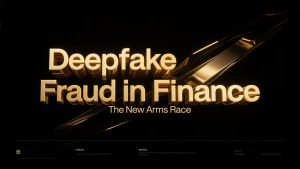Overview:
The same generative AI used for art and entertainment is now being weaponized to target financial institutions. Deepfake voice and video scams are rising sharply—triggering a new cybersecurity race.
Case Example:
In 2023, a Hong Kong company lost $25 million after a deepfaked CEO ordered a wire transfer during a fake Zoom call. Similar attacks are now being simulated in financial red-team exercises.

Responses:
-
Banks are deploying AI audio-authentication tools
-
Voice biometrics and real-time facial motion analysis are in trial
-
Regulatory bodies are drafting deepfake disclosure laws
Concerns:
-
Humans over-trust video and voice
-
Current detection models are slow or unreliable
-
Cross-border scams are harder to prosecute
Takeaway:
As synthetic media grows, financial fraud prevention must evolve faster than ever—or risk losing billions to illusions.







